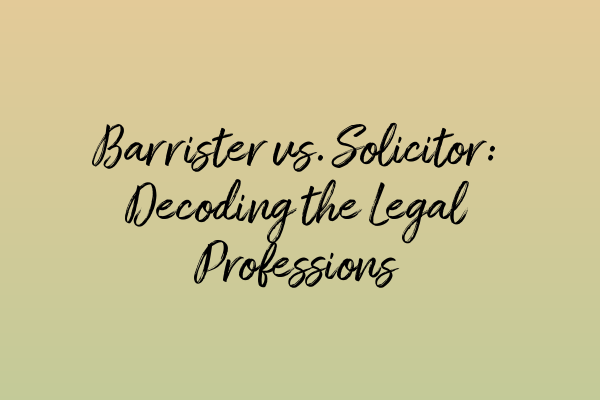Barrister vs. Solicitor: Decoding the Legal Professions
In the legal field, the terms “barrister” and “solicitor” are often used interchangeably, leading to confusion among those unfamiliar with the intricacies of the legal profession. While both barristers and solicitors are legal professionals, they have distinct roles and responsibilities within the legal system. In this blog post, we will dive deep into the world of barristers and solicitors, decoding their roles, qualifications, and the key differences between the two.
Let’s start by understanding the role of a barrister. A barrister is a specialist advocate who represents clients in court, providing expert legal advice and presenting arguments on their behalf. Barristers are skilled in courtroom procedures, oral advocacy, and the art of persuasion. They typically work independently or as part of a barristers’ chambers, which is a group of barristers sharing resources and expertise.
On the other hand, solicitors are legal professionals who engage with clients directly, offering a wide range of legal services. They are often the first point of contact for individuals and businesses seeking legal advice and assistance. Solicitors perform various tasks, including drafting legal documents, conducting research, negotiating settlements, and representing clients in lower courts. They play a crucial role in providing legal guidance and ensuring clients are well-informed about their rights and obligations.
Now that we have a basic understanding of the roles of barristers and solicitors, let’s explore the differences between the two professions.
Qualifications and Training:
Becoming a barrister involves completing a law degree, followed by the Bar Professional Training Course (BPTC). After completing these requirements, aspiring barristers must secure a pupillage, which is akin to an apprenticeship, where they receive practical training under the guidance of experienced barristers. The pupillage period lasts for one year and is divided into two stages – the “non-practicing” period and the “practicing” period. During the practicing period, barristers are licensed to represent clients in court.
On the other hand, solicitors typically follow a different path. They must also complete a law degree and then undertake the Legal Practice Course (LPC). After completing the LPC, aspiring solicitors must secure a two-year training contract with a law firm, where they gain practical experience across different areas of law. Once the training contract is completed, solicitors must obtain a Practicing Certificate from the Solicitors Regulation Authority (SRA) to practice law independently.
Responsibilities and Scope of Work:
Barristers’ primary role is advocacy. They specialize in presenting cases before judges and juries, cross-examining witnesses, and providing legal arguments to support their clients’ positions. Barristers often work on specific cases and are frequently instructed by solicitors to provide expert advice and representation in complex legal matters. It is important to note that barristers cannot directly approach clients and can only be instructed by solicitors or other authorized entities.
Solicitors, on the other hand, have a broader scope of work. They handle various aspects of legal practice, including drafting legal documents, negotiating settlements, and providing legal advice to clients. Solicitors are often engaged in legal matters that do not require courtroom representation, such as property transactions, family law issues, or commercial contracts. They also play a crucial role in ensuring compliance with regulations and advising clients on their legal rights and obligations.
Collaboration and Referrals:
Barristers and solicitors generally work hand in hand to provide comprehensive legal services to clients. Solicitors often refer cases to barristers when specialized representation or intricate legal arguments are required. Barristers rely on instructions from solicitors to provide expert advice and courtroom representation. This collaborative approach allows the legal profession to leverage the expertise and skills of both barristers and solicitors, ensuring the best possible outcome for clients.
In conclusion, while barristers and solicitors are both legal professionals, they have distinct roles within the legal system. Barristers are specialist advocates who represent clients in court, while solicitors engage directly with clients, providing legal advice and handling various legal matters. Their qualifications, training, and areas of expertise differ, but they often collaborate to deliver comprehensive legal services.
If you want to learn more about the legal profession and related subjects, check out these helpful articles:
1. [Private Prosecutions: Exploring Non-Governmental Prosecutions in Criminal Cases](https://criminal-practice-law-sqe.co.uk/private-prosecutions-exploring-non-governmental-prosecutions-in-criminal-cases/)
2. [Understanding Drug-related Offences: Laws and Penalties in the UK](https://criminal-practice-law-sqe.co.uk/understanding-drug-related-offences-laws-and-penalties-in-the-uk/)
3. [Magistrates’ Court vs Crown Court: Different Paths in Criminal Proceedings](https://criminal-practice-law-sqe.co.uk/magistrates-court-vs-crown-court-different-paths-in-criminal-proceedings/)
4. [Criminal Defence Strategies: Expert Approaches to Protecting Clients’ Interests](https://criminal-practice-law-sqe.co.uk/criminal-defence-strategies-expert-approaches-to-protecting-clients-interests/)
5. [Demystifying Criminal Law Procedures: A Step-by-Step Guide](https://criminal-practice-law-sqe.co.uk/demystifying-criminal-law-procedures-a-step-by-step-guide/)
Feel free to explore these articles to further enhance your knowledge of the legal profession and related topics. And if you have any legal inquiries or require professional advice, do not hesitate to reach out to Become Solicitor SRA – your trusted legal experts.


Leave a Reply